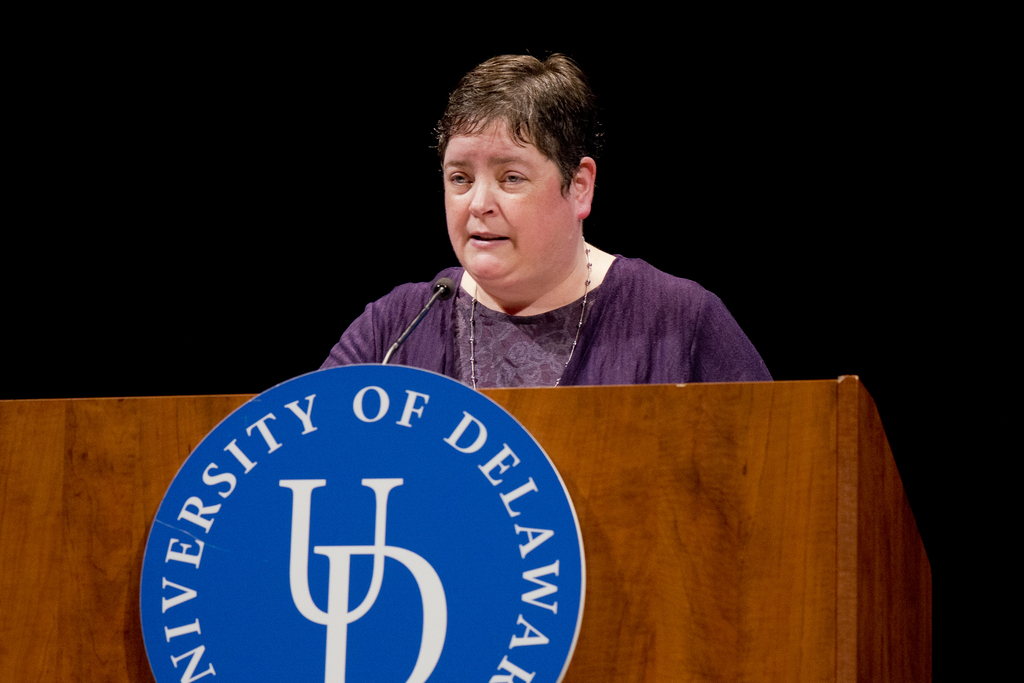A Talk with Jenny Lambe : Preventing Hate Speech
UD professor convenes conference on freedom of speech

By Caroline Gassert, University of Delaware junior and intern for the University of Delaware’s Center for Political Communication.
APRIL 22, 2019″University of Delaware communication professor and First Amendment expert Jennifer Lambe believes the best way to prevent the use of hate speech is to teach the population what hate is and why it should not be used. Last March, Lambe convened a two-day conference, entitled “Speech Limits in Public Life: At the Intersection of Free Speech and Hate,” to discuss issues related to the tension between freedom of speech and hate speech. Members of UD and the greater Delaware community gathered to discuss how to respond as a society to hate speech, and how to effectively combat it. Read the UDaily story to learn more about the conference.
The university welcomed guest speakers from across the nation to join a panel of distinguished authors, professors, and even former violent extremist Christian Picciolini to discuss the tensions between free speech and hate speech. The speakers examined the difficulties in monitoring and responding to hate speech on both digital platforms and on college campuses through legal and non-legal actions.
Dr. Jennifer Lambe, a founding faculty member of the Center for Political Communication, researches freedom of expression, media law and the effects of media on public opinion. She works with the university to host programming about free speech every semester, inviting both students and faculty to join this important conversation.
From controversy to constructive dialogue
On October 24, 2016, UD’s chapter of College Republicans invited controversial speaker Milo Yiannopoulos, a notably anti-transgender commentator, to speak at Mitchell Hall for the close of national Free Speech Week. Facing an uproar from students and community members, student activists and faculty needed to respond. “He wanted protests, instead of protests we hosted a positive event across campus,” Lambe recalled. More than 250 students and members of the university community attended the Unity Fair, which celebrated an inclusive community at UD.
Lambe has helped advance the conversation following the Milo Yiannopoulos program and a continued pattern of hate crimes across the nation. “We have freedom of expression, so where does that line come in where we can stop something because we think it’s going to be harmful?” Dr. Lambe asked.
As a child Lambe lived for a short period in Germany, the birthplace of her research interests. “My dad was a professor of mathematics at the University of Nebraska”Lincoln and we had lived in Germany for a year when I was 10. There was a man living in the university guest house who had to leave Iran because of government problems. I remember he couldn’t go back to Iran because he would be killed because of beliefs,” she said. This influential encounter pushed young Jennifer Lambe to recognize the inability of some to disagree with their governments.
Furthering her education in media law, Lambe received her PhD from the University of Minnesota, centering her research on media ethics and law, researching public opinion on free speech issues, and how freedom of expression reflects the values and fears of each country. Lambe pursued a career in higher education, much like her family before her, using the resources provided by the University of Delaware as “great first steps in the research process.”
Today, Lambe continues to explore freedom of expression, working to publish her first book, Remedies for Hate Speech. Lambe gave insight into her upcoming informative publication and how many define hate speech as something that should be regulated. “There is a range of hate speech, only some that should be dealt with through use of law,” said Lambe. These kinds of speech include true threats against an individual or specific target and when the context of the speech gives way to imminent physical violence. Lambe offered several ideas as “ways to protect speech without having to censor it.” She noted various preventative measures such as industry self regulation, monitoring digital platforms, advocacy campaigns against hate groups, tracking hate groups, and educational programs to combat hate.
